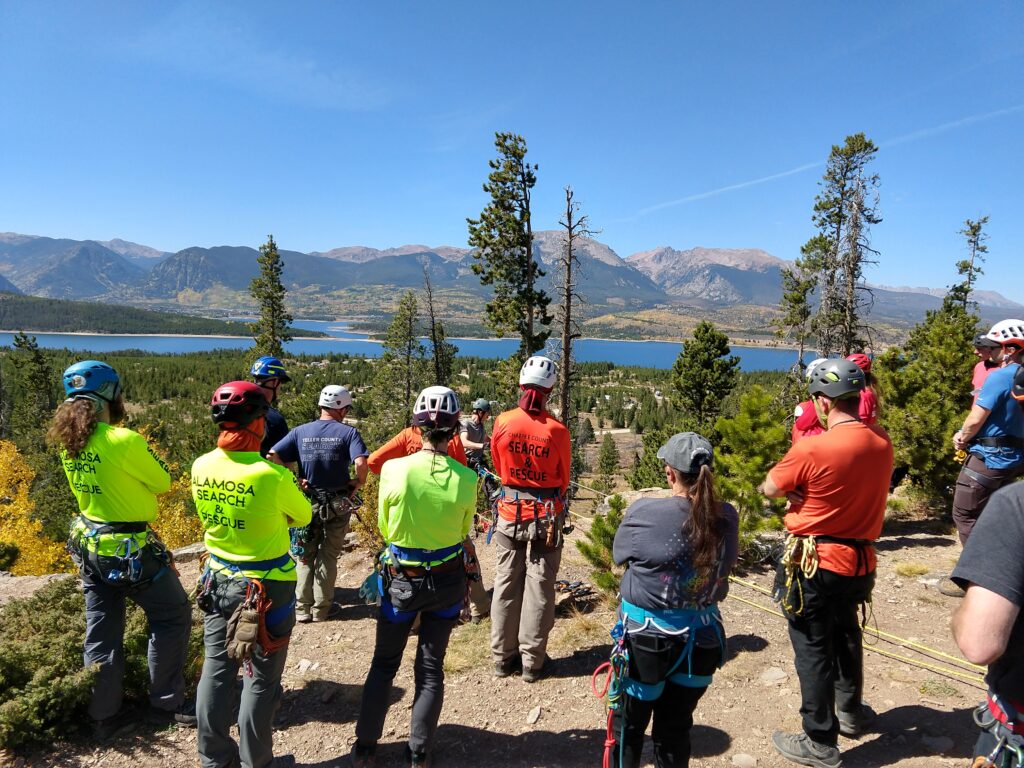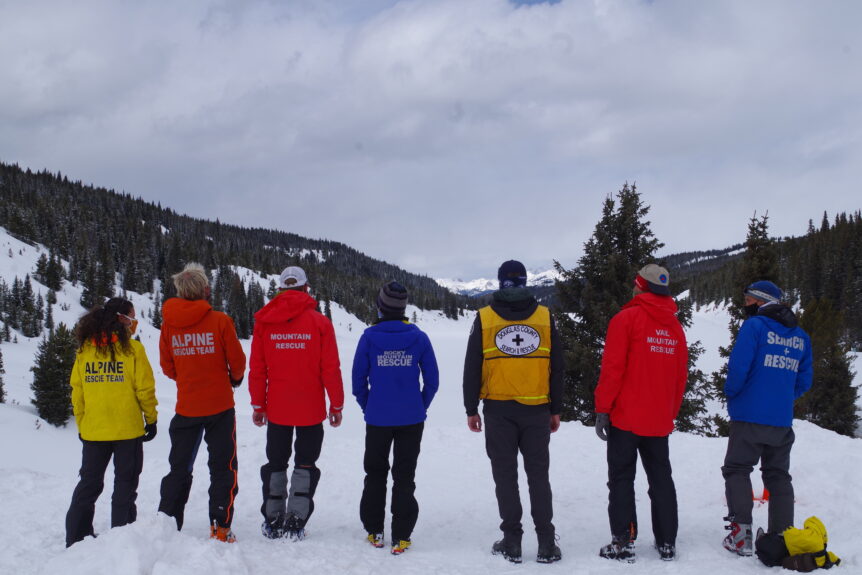CSAR is an association of member organizations focused on backcountry search and rescue (BSAR) in Colorado. Our members include nonprofit volunteer BSAR teams, sheriff’s offices, BSAR teams that work as part of a sheriff’s office, and partners such as air ambulances and the national parks within Colorado. Our mission is to provide resource coordination, advocacy, education and collaboration to the BSAR community, all in service of improving responder and rescue subject safety.
Resource coordination
CSAR maintains an on-call group of subject matter experts year-round to help local jurisdictions and state-level emergency response organizations in resolving BSAR incidents. They are called state BSAR coordinators, and we currently have 22 of them. Most are involved in their local BSAR teams and all have extensive, often decades, of experience in Colorado BSAR operations. When a sheriff’s office, its local SAR team, a national park, or a Native American tribe needs resources beyond what they can supply locally, it just takes one call or text by an authority and our state BSAR coordinators are on the job.
Resources they coordinate include specialized technical rescue teams, K-9 teams, federal cell phone forensics teams, aviation resources, and qualified field teams from other counties. Aviation resources include medical, state fire and National Guard helicopters; UAVs (drones); and specially equipped fixed wing aircraft along with the Colorado Wing of the Civil Air Patrol.
While local SAR incident management can call anyone they wish for help, CSAR coordinators maintain a real-time technical platform to provide situational awareness, coordination and communication to support all the players. CSAR’s primary goal is to ensure responders are safe, taken care of, and tracked until they are safely out of the field.
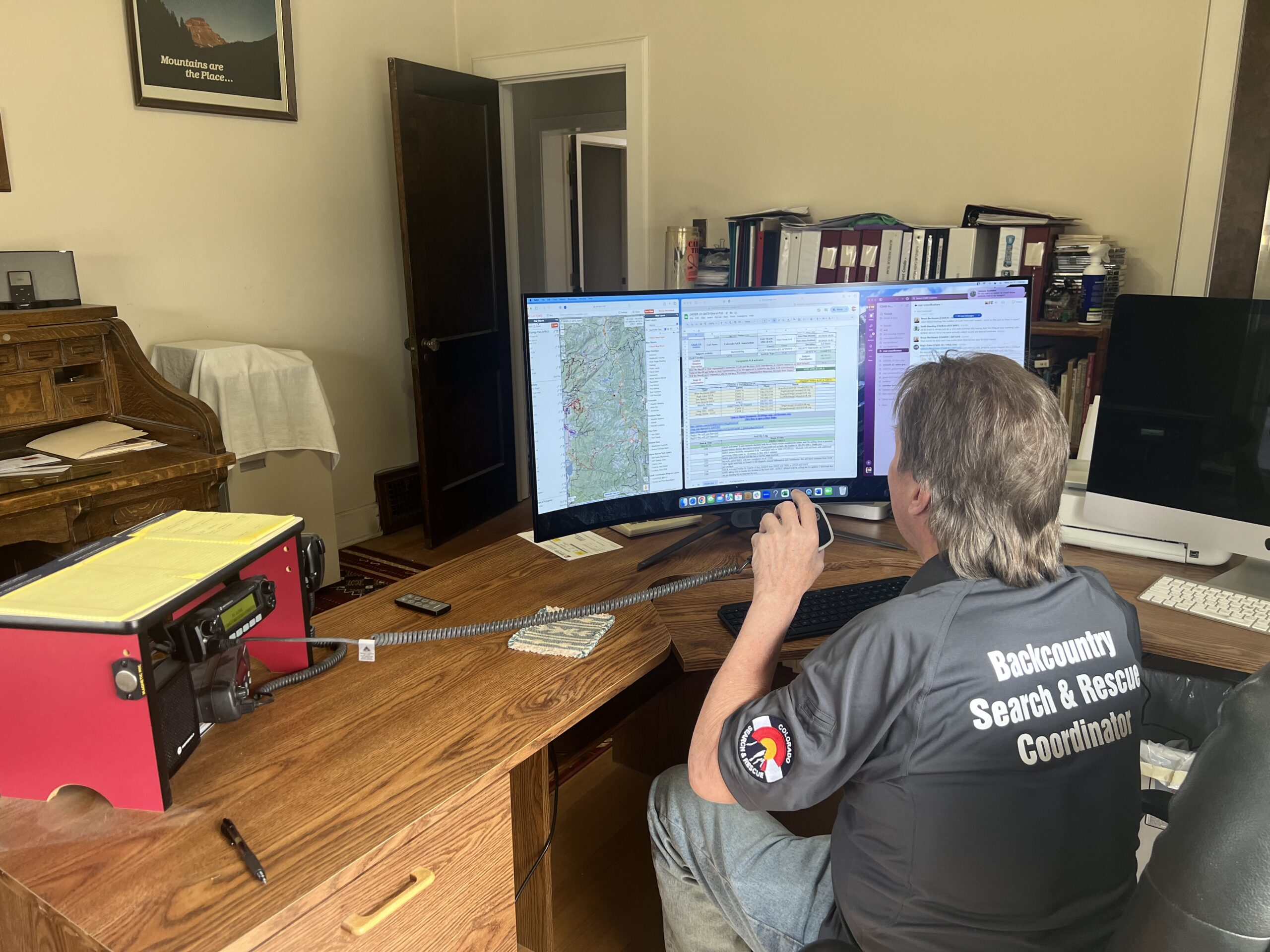
Some examples of CSAR coordinator work in the last year:
- Civil Air Patrol cell phone forensics in support of searches, beyond what is available through local dispatch or directly through a cellular provider.
- Targeted K9 resources that have resulted in lives saved and subjects found. Not all K9 resources are the same or appropriate to every circumstance, and CSAR coordinators have the expertise to determine what is needed for both the type of dog and the right support personnel.
- Some jurisdictions needed outside personnel to supplement or replace local incident management after a day or more on the incident, typically because they needed to get back to other responsibilities, needed rest and rehab, or could use a fresh set of eyes. This has resulted in lives saved while giving local incident commanders a much-needed break.
- Subjects injured and stuck in difficult high altitude terrain where the most appropriate rescue resource is a powerful helicopter equipped with a hoist and staffed by experienced volunteer professional responders from our CSAR member teams. You can read more about helicopter hoist rescue here.
Advocacy
CSAR continues its focus on the sustainability of the BSAR system in Colorado due to constantly rising call volume and a changing volunteer society. A primary goal of CSAR has always been the safety of the professional volunteer responders and supporting them so they are able to respond when needed. Our state, with its trillion-dollar outdoor recreation economy, sees increasing numbers of residents and visitors recreating in the backcountry every year. Some teams have challenges with recruiting or retaining volunteers due to the remoteness of the area or the cost of living in a mountain town, and other teams have challenges finding volunteers to handle the administrative load of the team. Most BSAR teams have to fundraise to support their operations, and volunteer responders often pay out of pocket for personal gear, training, and for transportation costs. CSAR works toward lessening these burdens for our members.
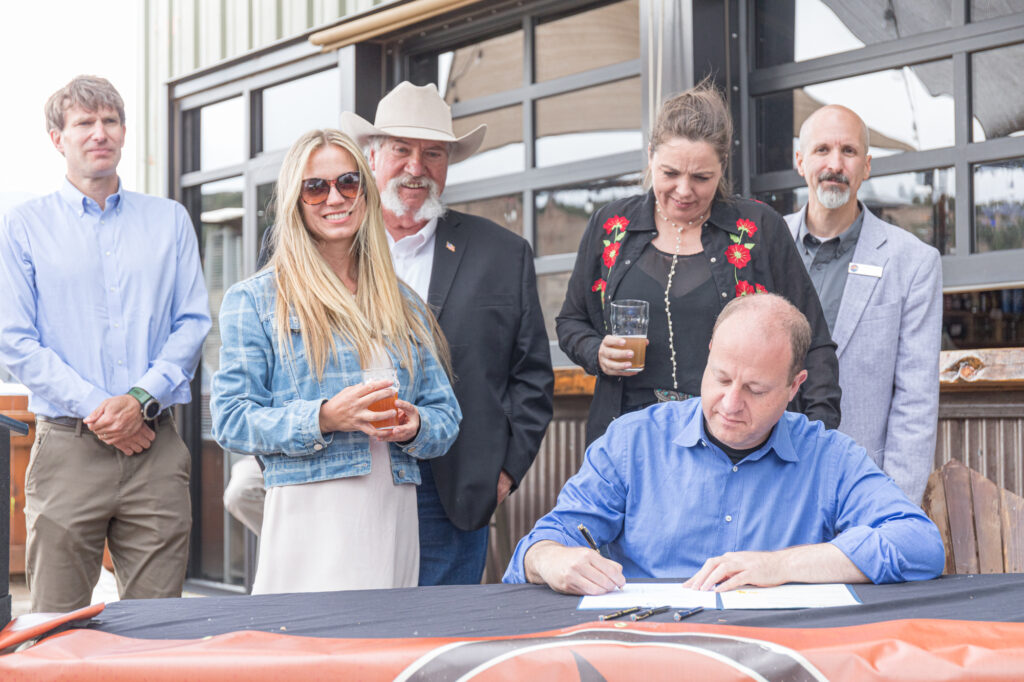
Between 2020 and 2022, CSAR helped draft and advocated for several bills that were passed by the Colorado state legislature and signed into law by Governor Polis. These bills funded a study of Colorado’s BSAR system, mental health resources for volunteers, and ongoing state funding for BSAR. You can read more about one of the bills here.
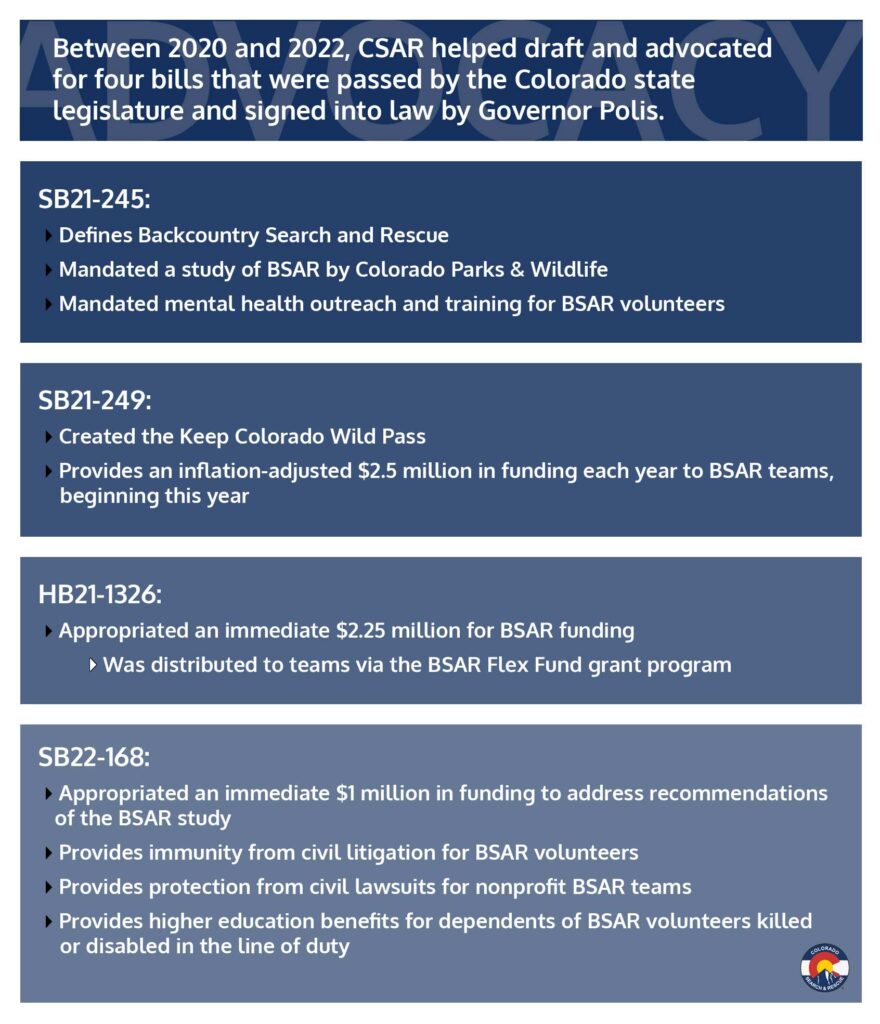
Education
CSAR’s education efforts are focused on both volunteer responders and the general public. Over the past two years, CSAR has completely redesigned its classes for volunteer responders. The classes have been updated to a hybrid model of remote and inperson events and have adopted current best practices in adult educaiton. The search management, BSAR focused mapping, and public information officer classes continue to be very popular with volunteer responders across the state. CSAR is looking to expand its educational opportunities to better support the changing needs of our members.
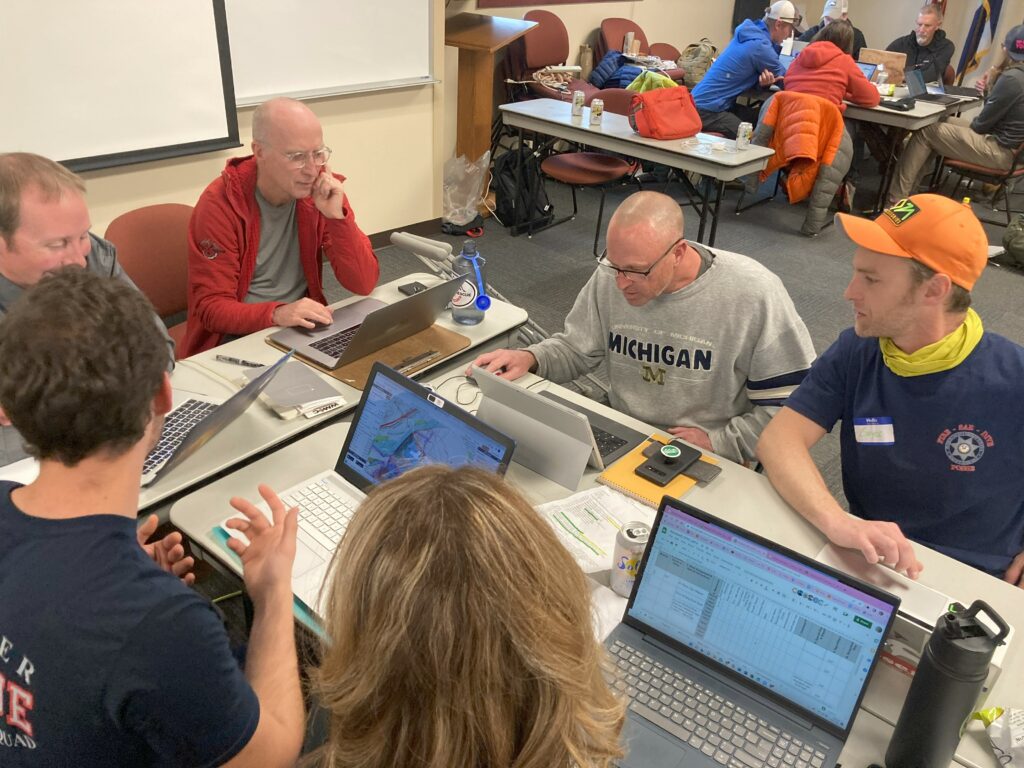
Externally, our public information officers educate the public about backcountry safety through traditional media interviews, our social media channels, a blog on our website, special projects such as documentaries, and project-partnerships with our member teams focused on a particular need. For example, after a series of unresolved searches for missing trailrunners in the summer of 2022, we partnered with two of our member teams to produce materials aimed at educating trailrunners to carry essential survival items with them and leave a detailed route plan with someone back home.
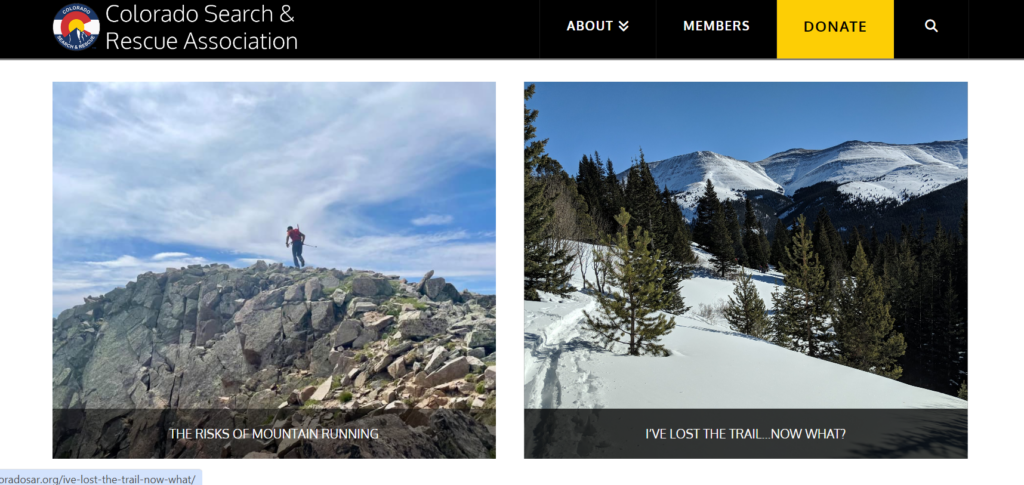
Collaboration
The people who work with CSAR are all volunteers from BSAR teams across the state. It’s a lot to ask of them – to volunteer time for CSAR on top of the time they volunteer for their teams, all of which must be balanced with their day jobs and family responsibilities. Why do we do it? Because we know that together we are stronger, smarter and more creative. We can share what’s working and what’s not, solve more problems, and make the system better. CSAR sponsors an annual search and rescue conference, email discussion groups and forums all aimed at improving collaboration. Our executive director travels around the state continuously, meeting with the BSAR community to learn more about how we can collaborate better. Are you a volunteer with one of our member teams and looking to make a greater impact? Drop us a line — CSAR is always looking for people who are interested in working with our programs.
